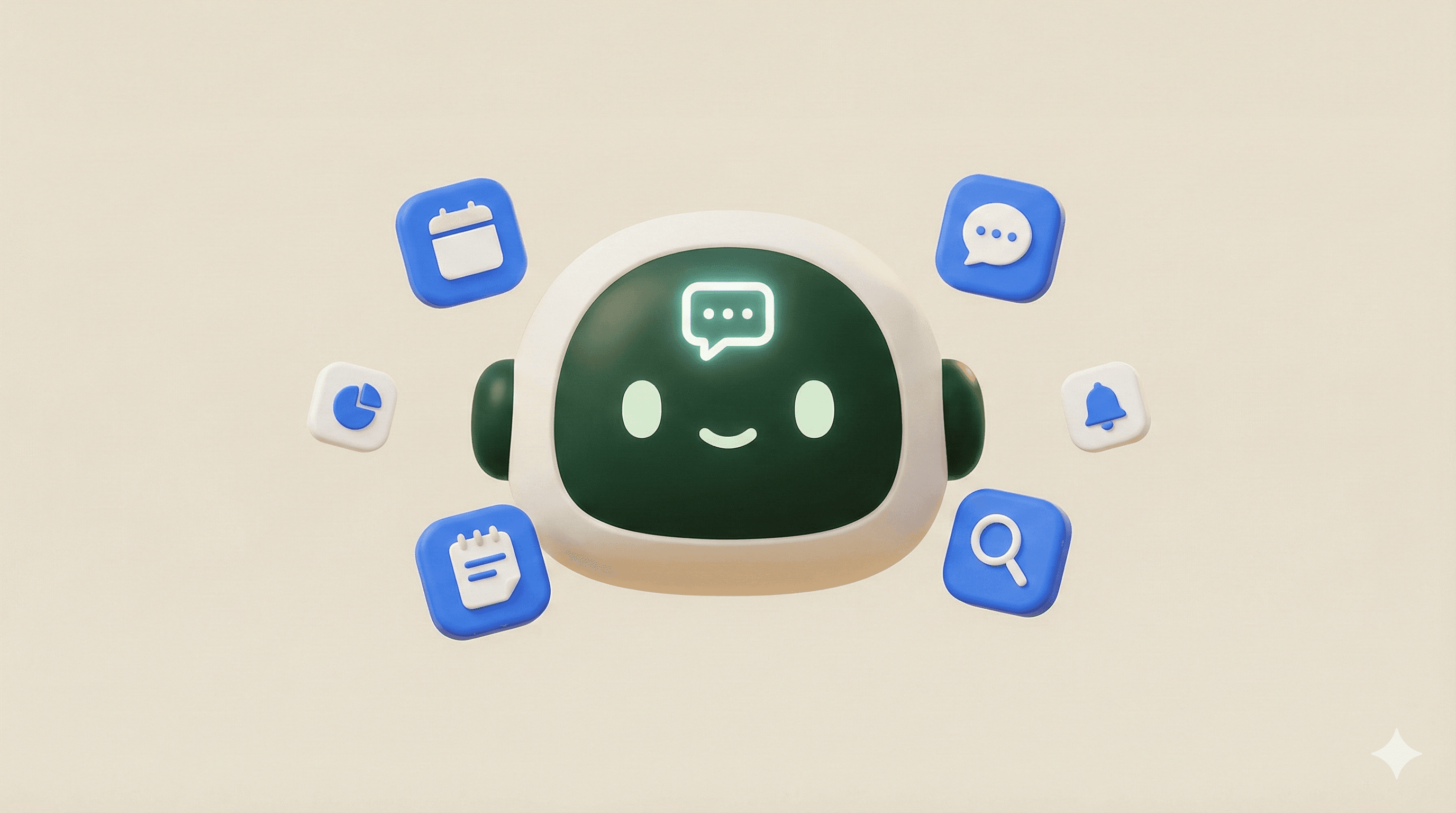Why AI Assistant Apps are Rising in Popularity?
AI can write essays, paint portraits, and even compose music, so why are we still wasting hours stuck on hold for customer service to solve our problem?
You’ve been there. You spot a weird charge on your bill or want to cancel a subscription you barely use. You call customer service. Instead of a human, a robot answers. You wade through a maze of menus, only to hear, “Your estimated wait time is… one hour.” Infuriating. This shared misery isn't just a feeling, it's a fact. Research from Gradient Labs in 2025, found that a staggering 75% of consumers rank long waiting times as a major customer service frustration, with 52% believing companies intentionally complicate the process. I know I've yelled "representative" into the phone many many many times. Seriously?
This isn't an accident. It feels like companies are making it harder to reach a human to cut their own costs, leading to a trend in 2024 of people calling it the "#customerservicedecline" online. We're all tired of it. That’s precisely why AI personal assistant apps are on the rise. They are the practical tool to fight back and reclaim your time.
What is an an AI Assistant App - How it is Defined?
So by an "AI assistant app", this an AI personal assistant for your actual life; the messy, everyday stuff. We're focused on apps built for you, the consumer, not some big business. Think of them as tools for handling your day-to-day chaos. We’re not talking about some clunky, corporate software for boosting your work productivity.
To pick the best ones for this list, the team looked at a few key things:
- User-friendliness: Can a normal person use it without wanting to throw their phone at a wall?
- Features and capabilities: What does it actually do? Does it have the tools you need?
- Compatibility and integration: Does it play nice with your phone and other apps?
- Privacy and security: Can you trust it with your info? Super important.
- Costs: Is it free? Are there shady hidden fees? Is it actually worth the money?
Quick Comparison: Top 10 AI Assistant Apps (2025)
| App Name | Category | Key Features | Pricing | Platforms |
|---|---|---|---|---|
| Pine AI | AI Customer Service Agent | Handles calls, cancels subscriptions, files complaints for you. | Pay-as-you-go | Web, iOS |
| Google Assistant | General AI Assistant | Voice commands, sets reminders, integrated with Google services. | Free (built-in) | Android, iOS, Smart Devices |
| Microsoft Copilot | General AI Assistant | Integrates with Microsoft 365, answers complex questions, image generation. | Free (Pro version available) | Windows, macOS, Android, iOS, Web |
| Amazon Alexa+ | Smart Home & AI Assistant | Voice control for smart home, plays music, conversational AI. | Free (Plus subscription required for advanced features) | iOS, Android, Echo Devices |
| Apple Intelligence | OS-Integrated AI Assistant | Summarizes text, creates images, integrated deeply into iOS/macOS. | Free (with compatible devices) | iOS, iPadOS, macOS |
| Hound | Voice AI Assistant | Natural language voice search, fast responses, follow-up questions. | Free | Android, iOS |
| Robin | Voice AI Assistant | Hands-free assistant for driving, reads texts, gets directions. | Free (with in-app purchases) | Android |
| AI Butler | Task Automation Assistant | Manages schedules, sends emails, automates daily digital tasks. | Subscription-based | Web |
| Manus | General AI Agent | Delegates complex tasks, learns from your actions, web automation. | Subscription-based | Web, Desktop App |
Detailed App Breakdowns
Pine AI
Pine AI launched in late 2024 as a direct answer to the nightmare of modern customer service. If you’ve ever dreaded disputing a bill, canceling a subscription, requesting a refund or filing a complaint because of endless hold music, this app does the call for you. Having the function of having an AI handle a 45-minute call with my internet provider has helped me focus my time on other things instead. Research from Statista projects that by 2031 most consumers will rely on AI agents instead of websites to handle everyday tasks, a shift Pine AI is already ahead of, helping people cut through the noise today.
Best for: Outsourcing your frustrating customer service calls.
"Is it biased to put our own AI assistant at the top of the list? Yep. But since our app is designed to save you time by cutting through the fluff, consider this our first gift of efficiency to you."
Key Features:
- Autonomous Issue Resolution: The AI handles the entire process of resolving issues with customer service.
- Bill Negotiation: It can haggle to lower your recurring bills, meaning it will call them for you and negotiate.
- Complaint Filing: Files complaints on your behalf to get results.
Pros:
- Saves you from the insanity-making experience of call centers and hold times.
- On average 20% saved with telecom and cable bills.
- It does all the heavy lifting for you.
Cons:
- It’s a newer service, so constantly adding features and waiting for reviews.
- The pricing is pay as you go, so fees depending on the task will differ
- It's only available on iOS and Web, no Android currently ( as of November, 2025)
Pricing: Pay as you go pricing based on the task required. Source: 19Pine.AI as of November, 2025.
Who it’s for: Anyone who's tired of being nickel-and-dimed and values their sanity. Actually, someone who wants a service to do the work for them without paying for a subscription that may or may not work.
Google Assistant
Google Assistant has been around since 2016, and it's basically the default AI personal assistant for the entire Android ecosystem. It's less of an app you download and more of a feature baked into everything Google. Its main job is to answer your questions, control your smart home devices, and integrate with your Google Calendar and Gmail. It's gotten impressively good at understanding natural speech over the years. An update in 2024, expanded its ability to summarize web pages, which is handy (Source: Google Blog, May 2024). But let's be honest, it won't call your cable company for you. It's a fantastic generalist, perfect for quick questions and hands-free tasks.
- Best for: Quick voice commands and managing your Google life.
- Key Features:
- Deep integration with Google services (Maps, Calendar, etc.).
- Voice control for thousands of smart home devices.
- "At a Glance" feature provides proactive information.
- Pros:
- It's free and already on most Android phones.
- Incredibly fast and accurate for general knowledge questions.
- Voice recognition is top-notch.
- Cons:
- Privacy can be a concern since it's tied to your Google account.
- Not great for complex, multi-step tasks. It does nothing for you.
- Can feel more reactive than proactive at times.
- Pricing: Free. Source: Google as of July, 2025
- Who it’s for: The Android user who is fully invested in the Google ecosystem.
Microsoft Copilot
Microsoft threw its hat back in the ring in 2023 with Copilot, effectively replacing its old assistant, Cortana. Copilot is Microsoft’s answer to the new wave of generative AI, and it’s a powerful one, especially if you live in Microsoft Office all day. It uses OpenAI's latest models to help you write emails, summarize documents, and create presentations, which is a massive time-saver for anyone with an office job who has ever stared at a blank Word document for twenty minutes. The big news is its deeper integration into Windows 11, making it a core part of the desktop experience (Source: Microsoft, July 2024). It's an impressive productivity tool, but it's not really designed to manage your personal life.
- Best for: Boosting productivity within the Microsoft ecosystem.
- Key Features:
- Integrates directly into Microsoft 365 apps like Word, Excel, and Teams.
- Can generate text, code, and images from simple prompts.
- Summarizes long email threads and documents.
- Pros:
- Extremely powerful for work-related tasks.
- The free version is very capable.
- Constantly being updated with new features.
- Cons:
- Copilot analyzes users data to learn and improve, which may raise privacy concerns to some people
- It's heavily focused on productivity, not personal life management.
- Can feel a bit clunky to use outside of the Microsoft ecosystem. Honestly, every time I try to open a Microsoft App, Copilot has to jump in and interrupt. It's crazy-making.
- Pricing: Free version available. Copilot Pro is $20/month per user. Source: Microsoft as of August, 2025
- Who it’s for: The power user or remote worker who lives and breathes Microsoft Office. Did I say Microsoft...Microsoft...Microsoft.
Amazon Alexa+
Alexa first appeared in 2014, and it basically created the smart speaker market. For years, it's been the go-to for playing music, setting timers, and controlling smart lights. Now, with "Alexa+", Amazon is trying to make it a true conversational AI. This paid upgrade is meant to give Alexa a more natural, human-like personality and the ability to handle more complex requests (Source: Amazon, February, 2025. The idea is to move beyond simple commands to real conversations. Honestly, I'm still a bit skeptical until I see it in action, but it's a step in the right direction. It's still the king of the smart home, though. Who isn't a slave to Amazon?
- Best for: Controlling your smart home and playing audio content.
- Key Features:
- Extensive library of "skills" that add new abilities.
- Excellent smart home device compatibility.
- New generative AI features for more natural conversation (Plus).
- Pros:
- Works with a huge range of smart devices.
- Great for hands-free control around the house.
- The standard version is free to use on Echo devices.
- Cons:
- Iniitial users have reported the roll out to be buggy. Setting every device up that isn't Google related is tedious.
- Can sometimes misinterpret commands. A lot.
- Like Google, there are valid privacy concerns.
- Pricing: If you're an Amazon Prime member, then it will be free Source: Amazon as of February, 2025
- Who it’s for: The homeowner who wants to build a fully voice-controlled smart home.
Apple Intelligence
Announced in 2024, Apple Intelligence is Apple's long-awaited entry into the modern AI game. It’s not a standalone app but a new layer of intelligence built directly into iOS, iPadOS, and macOS. The focus is on privacy and personal context. It can summarize your notifications, help you write better emails, and create images right inside your apps. The promise is an AI that knows you because it lives on your device, not in the cloud (Source: Apple, July 2025). This is a huge deal for privacy-focused users, but you'll need the latest and greatest Apple hardware to even use it. It's a powerful vision for a personal ai assistant, but it's still very new.
- Best for: Seamless and private AI assistance within the Apple ecosystem.
- Key Features:
- On-device processing for most tasks, enhancing privacy.
- Deeply integrated into native apps like Mail, Messages, and Photos.
- Advanced writing and image creation tools.
- Pros:
- Best-in-class privacy protection.
- Feels like a natural extension of the OS, not a bolt-on feature.
- Free for users with compatible devices.
- Cons:
- Requires a very new iPhone, iPad, or Mac to work.
- Not available on other platforms like Windows or Android.
- It's the first version, so expect some bugs and missing features.
- Pricing: Free with the purchase of a compatible Apple device. Source: Apple as of November, 2025
- Who it’s for: The die-hard Apple fan with the latest hardware who values privacy above all else.
Hound
Hound, from the makers of SoundHound, launched way back in 2015 with a focus on one thing: being the best at understanding natural human speech. It's designed to handle complex questions and follow-up queries without you having to rephrase everything. You can ask something like, "Show me coffee shops within a 10-minute walk that are open past 8 PM and have Wi-Fi," and it will actually get it right. It’s seriously impressive technology. The company recently integrated its voice AI with NVIDIA's platform for in-vehicle assistants, showing its continued focus on advanced voice tech (Source: SoundHound, March 2025). This app is for people who get frustrated having to talk to other assistants like they're toddlers.
- Best for: Answering complex, multi-part voice questions accurately.
- Key Features:
- Understands complex sentences and follow-up questions.
- Combines its own platform with external data sources for answers.
- Fast response times for voice queries.
- Pros:
- Arguably the best natural language processing of any assistant.
- Great for hands-free use when you need detailed answers.
- It's completely free to use.
- Cons:
- Lacks the deep smart home integrations of Alexa or Google.
- The user interface feels a bit dated.
- It's not as well-known, so it has fewer integrations overall.
- Pricing: Free. Source: SoundHound as of July, 2025
- Who it’s for: The person who wants to ask complicated questions out loud and get a straight answer the first time. Kinda silly, but also kinda cool.
Robin
Robin has been around since 2012, positioning itself as the go-to AI assistant for when you're on the road. It's built for hands-free use in the car. It can read and reply to texts, manage your playlists, and find the best route, all through voice commands. The whole point is to keep your eyes on the road. While other assistants have added driving modes, Robin has always been focused on this specific use case, making it feel more streamlined for drivers. Weirdly, this only worked on my iPhone not on an Android device for a while, but that seems to have been fixed. It’s a solid, focused tool that knows what it’s good at.
- Best for: Hands-free assistance while driving.
- Key Features:
- Reads and responds to texts from various messaging apps.
- Voice-controlled navigation and music playback.
- Can be customized with different voices and commands.
- Pros:
- Simple, driver-friendly interface.
- Strong focus on safety and hands-free operation.
- Good at handling basic in-car tasks reliably.
- Cons:
- Only available on Android.
- Not very useful when you're not in the car.
- The AI isn't as advanced as Google Assistant or Copilot.
- Doesn't your phone AI answer all these questions already? "Hey, Siri...."
- Pricing: Free, with in-app purchases available. Source: Aptoide as of August, 2025
- Who it’s for: The daily commuter who wants a simple, dedicated assistant for the road.
AI Butler
Launched in 2023, AI Butler aims to be your personal digital secretary. It's less about voice commands and more about automating the digital grunt work in your life. You can instruct it to manage your calendar, sort your emails, book appointments, and even conduct online research for you. Think of it as a set of rules and actions you can trigger with a simple command. It’s designed for people who feel overwhelmed by the sheer volume of digital admin. It takes a bit of setup, but once it’s running, it can clear a lot of clutter from your plate, which is a huge mental relief.
- Best for: Automating routine digital tasks and managing schedules.
- Key Features:
- Connects to various apps like Gmail, Calendar, and Slack.
- Automates workflows based on your instructions.
- Can draft emails and messages for you.
- Pros:
- Very powerful for anyone who wants to automate their life on the go.
- Can save you hours of repetitive work each week.
- The focus on text-based commands is great for use in an office.
- Cons:
- There's a learning curve to set up the automations.
- It's a subscription service, so it's another monthly bill.
- Lacks the conversational, voice-first approach of other assistants.
- Pricing: Subscription plans available starting from $20 for a single. Source: Butler AI as of November, 2025
- Who it’s for: The super-organized person (or someone who wants to be) who loves setting up automations.
Manus
Manus, which launched its beta in 2024, describes itself as a "general AI agent." It's one of the most ambitious tools on this list. The idea is that you can delegate almost any digital task to it, from planning a vacation to researching a product and making the purchase. It bridges the gap between an idea and getting it done. It learns from your feedback and can perform complex, multi-step actions across different websites and apps. It's still very new, but based on current trends, this type of agent-based AI is the future. Watching it complete a complex task is pretty wild.
- Best for: Delegating complex, multi-step digital tasks from start to finish.
- Key Features:
- Can navigate websites and use apps to complete tasks.
- Learns your preferences over time to act as your agent.
- You can give it high-level goals, and it figures out the steps.
- Pros:
- Incredibly powerful and futuristic concept.
- Has the potential to automate almost anything you do on a computer.
- The interface is clean and focused on task delegation.
- Cons:
- It's still in early access, so success rates are unclear.
- It's expensive.
- Giving an AI this much autonomy might make some people nervous, but others excited.
- Pricing: Starts at $29/month for the Basic plan. Source: Manus as of August, 2025
- Who it’s for: The early adopter who wants to be on the cutting edge of AI, have a personal assistant on hand and is willing to pay for it.
What Should I Look Out for in an AI Assistant App
Alright, let's have a real talk. Not all of these apps are going to change your life. Some of them are just junk. Here’s what you need to look out for so you don’t waste your time or your money.
- Security is a big deal. Don't be an idiot and give your bank login to some random app you just downloaded. Make sure it has bank-level encryption and a privacy policy you can actually read. If you can't find it, delete the app.
- Watch out for sneaky fees. A lot of these apps will try to rope you in with a free trial, and then BAM, you're hit with a monthly fee you didn't know about. Read the fine print before you sign up. I saw a post on Reddit where a guy was paying $10 a month to save $5. Just cancel it.
- Read the latest reviews. Don't bother with reviews from 2022. Look at what people are saying now. An app can go from hero to zero in a single update.
- Does it actually solve a problem? It sounds basic, but some of these apps are just fancy gimmicks. Make sure the features are actually going to make your life easier. If you get ripped off, you can always file a complaint with the Consumer Financial Protection Bureau (CFPB), which has recently cracked down on "dark patterns" companies use to trap you in subscriptions. (CFPB, January 2025).
Conclusion: Save time and money with an AI assistant.
Life is complicated enough. You shouldn't have to spend your precious free time arguing with your internet provider or trying to figure out where your money went. A survey report from Empower in 2025 found that Americans spend nearly four hours a day thinking about money, that's around half the working day spent thinking and stressing about finances. Even if you only worry about finances one hour a day, that's still 365 hours a year you would then save.
This is where a personal AI assistant comes in. These apps are designed to give you back your time and your money. Whether it's an AI assistant for customer service like Pine AI that handles the dirty work for you, or a budgeting buddy like YNAB that makes saving money work but worth it, these tools are it here to help. It's time to let the robots handle the boring stuff so you can get back to living your life.
Methodology: How We Selected the Best AI Assistant App?
This list didn't just appear out of thin air. To find the best apps out there in 2025, our team looked at over 15 of the most popular financial apps. We judged them on four main things:
- Effectiveness & User Success: Does the app actually work? We looked at user reviews and real-world results to see if people are actually getting what they were promised.
- Ease of Use: How easy is it for a regular person to use? We focused on apps that you don't need a Ph.D. in finance to understand.
- Security & Trust: Does the app have bank-level security and a clear privacy policy? We didn't mess around with anything that looked sketchy.
- Value for Cost: Is the price, if there is one, actually worth it? We looked at whether the features and potential savings justified the cost.
Frequently Asked Questions about AI Assistant Apps?
What is the best app to AI Assistant App?
The "best" one is the one that solves your biggest problem. For bill headaches, it's Pine AI. For an all-in-one life organizer, Google Assistant could be a great choice.
How do I use AI to cancel unnecessary subscriptions?
Some apps will scan your bank statements to find all your recurring subscriptions. Then you can cancel the ones you don't want with a single tap.
What features should I look for in an AI Assistant app?
Look for features that will actually make your life easier. That could be bill negotiation, budget tracking, or just simple task reminders. And make sure it's secure.
Are AI assistant apps safe?
The good ones are. Stick with apps that are upfront about their security and have a solid reputation. If an app feels shady, it probably is.
What app helps saves me time and money?
Pine AI is built from the ground up to save you time and money on your bills. Cleo is another great choice for saving money through smarter budgeting.
Are there any free ways to manage my bills?
Of course. You can always use a spreadsheet or set reminders on your phone's calendar. It's not as fancy as an AI app, but it's a lot better than doing nothing.
Sources
- https://gradient-labs.ai/blog/press-1-for-support-2-for-frustration, Survey conducted in May, 2025 about customer service processes - Gradient Labs
- https://www.19pine.ai/, AI Assistant to Handle Bills, Subscriptions, and Complaints - Pine AI
- https://www.forbes.com/sites/kolawolesamueladebayo/2025/08/01/are-ai-agents-the-future-of-customer-service/, Forbes - Are AI Agents The Future Of Customer Service, August, 2025
- https://support.microsoft.com/en-us/topic/end-of-support-for-cortana-d025b39f-ee5b-4836-a954-0ab646ee1efa, End of support for Cortana, July, 2024
- https://www.microsoft.com/en-us/store/b/copilotpro, Copilot Pro Plan & Pricing – Premium AI Features & Latest Models. from Microsoft Store, August, 2025
- https://www.aboutamazon.com/news/devices/new-alexa-generative-artificial-intelligence, Introducing Alexa+, the next generation of Alexa, February, 2025
- https://www.apple.com/apple-intelligence/ Apple Intelligence - Apple, August 2025
- https://www.soundhound.com/newsroom/press-releases/soundhound-ai-to-spotlight-voice-ai-innovation-at-2025-nvidia-gtc/ SoundHound AI to Spotlight Voice AI Innovation at 2025 NVIDIA GTC - SoundHound, March, 2025
- https://robin.en.aptoide.com/app Robin - AI Voice Assistant - APK Download for Android, Aptoide, August, 2025
- https://www.butler.ai/pricing - Butler, Pricing, July, 2025
- https://manus.im/app - About Manus App, August, 2025
Disclaimer about this blog post: This article was last updated on November 17, 2025. We do our best to keep our content accurate and fresh, but the digital world moves fast. Information, especially details like pricing and app features, is often sourced from third-party sites and may change without notice.
If you see something that looks out of date or incorrect? Please let our team know by contacting us and we'll get it updated as soon as possible.






